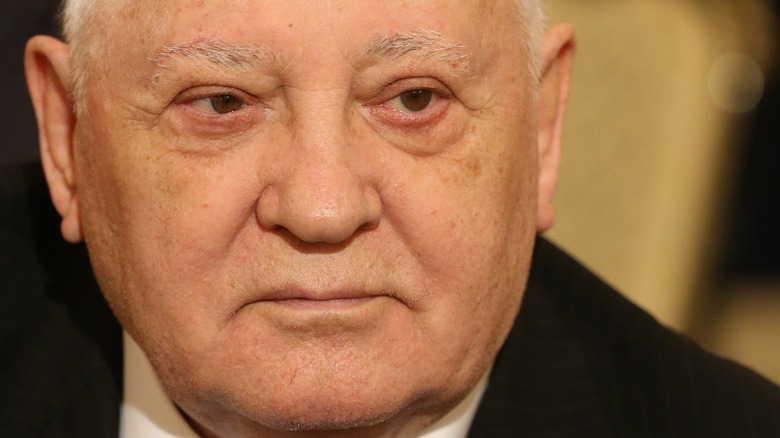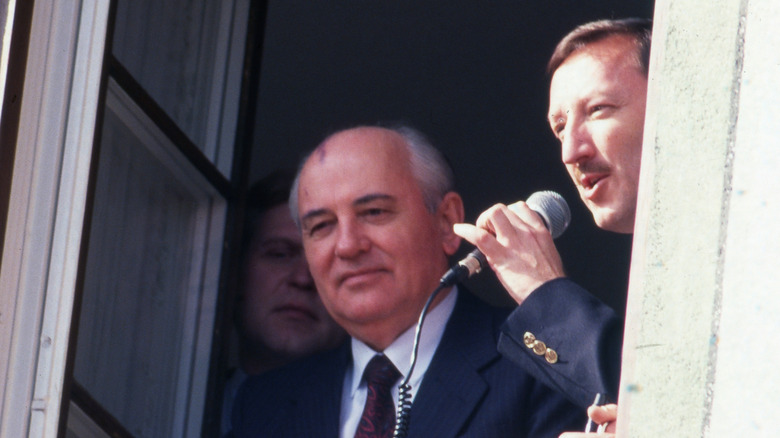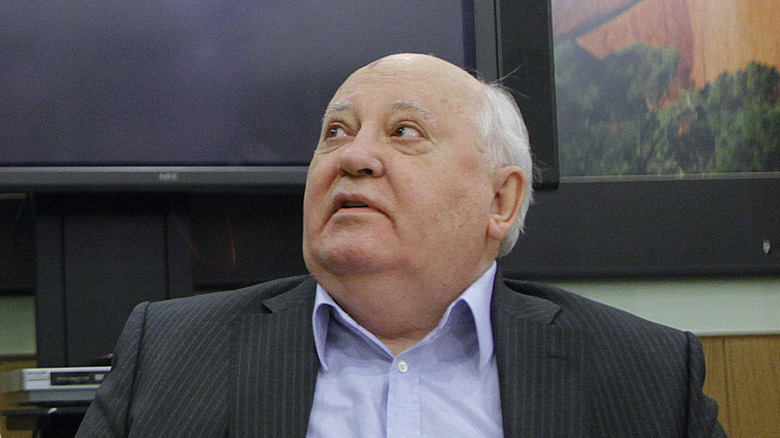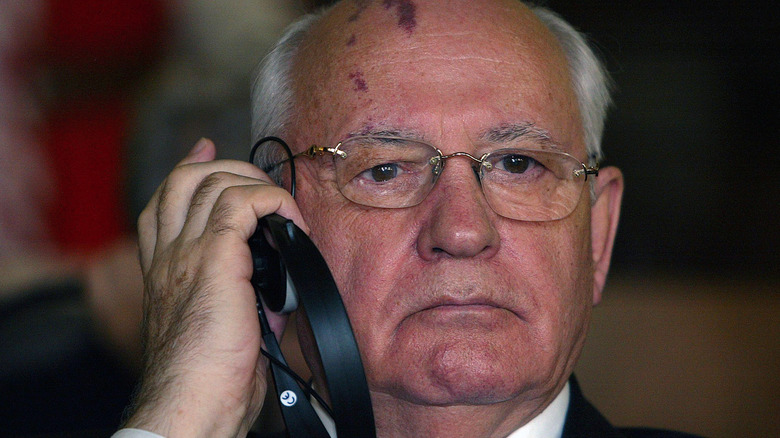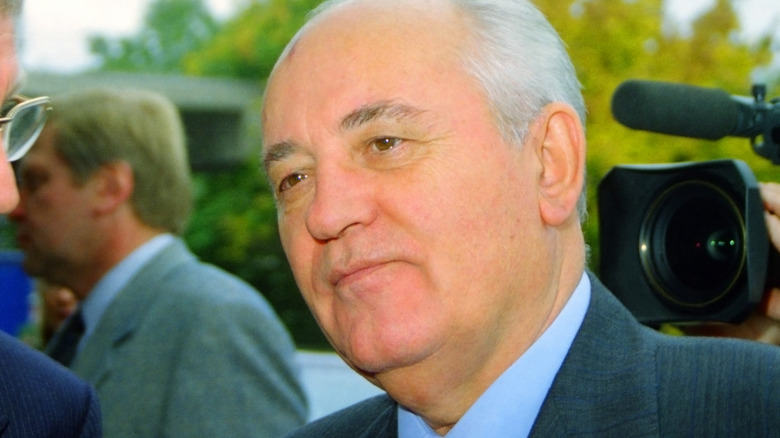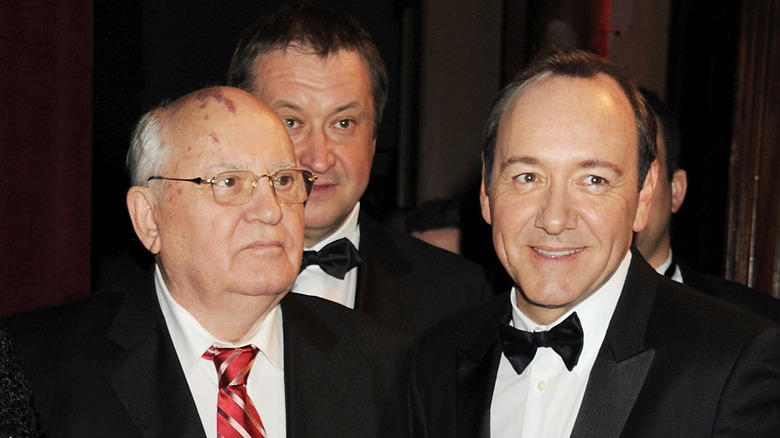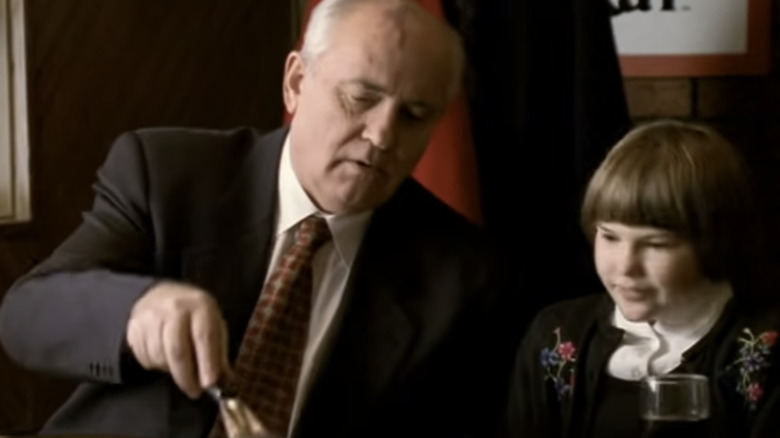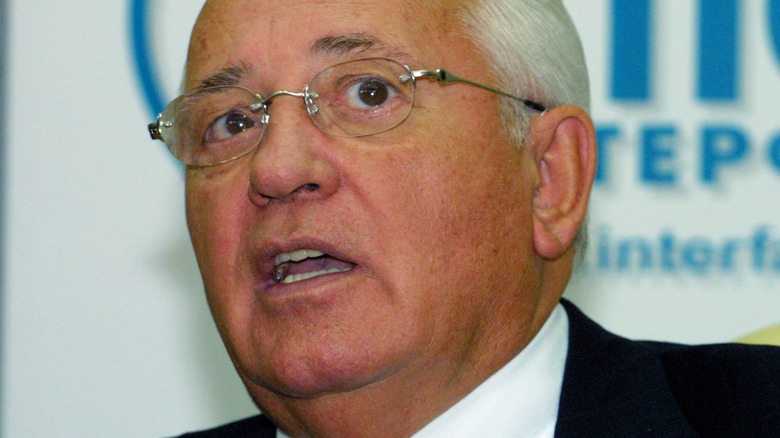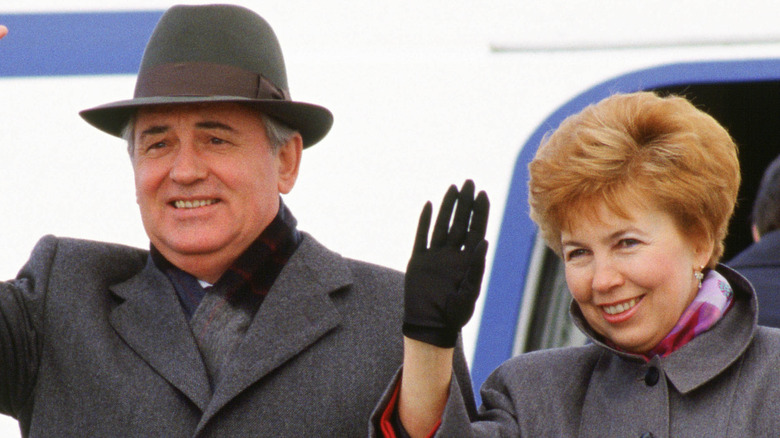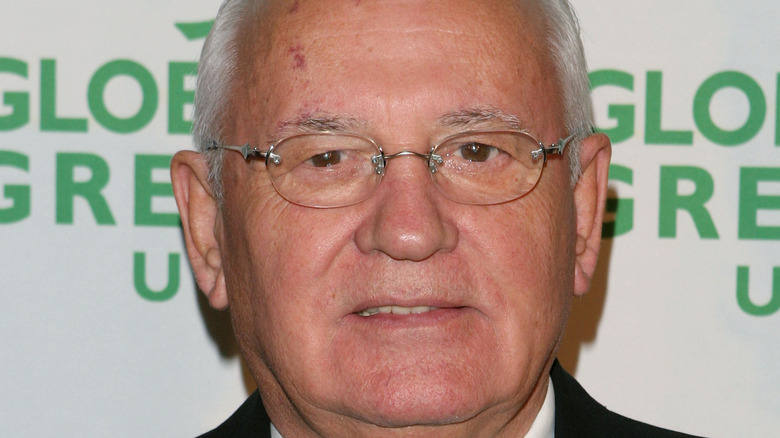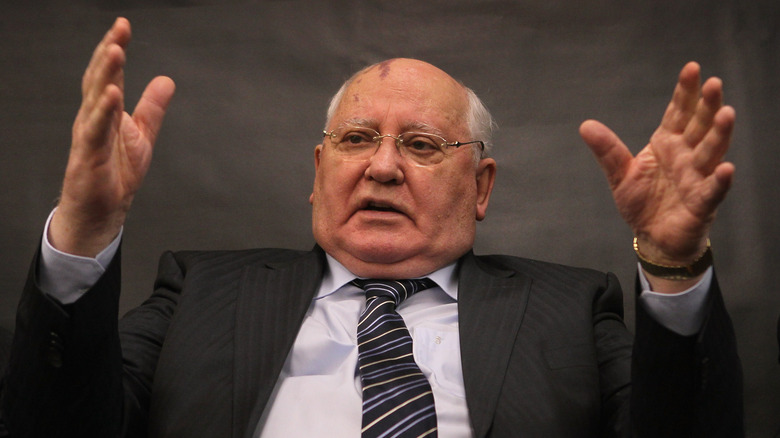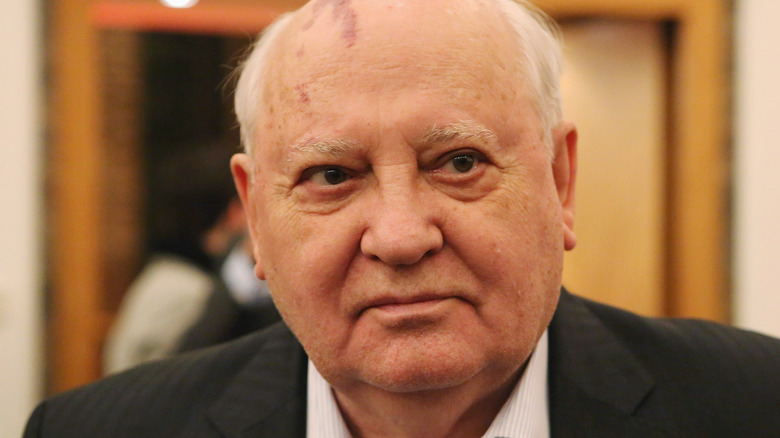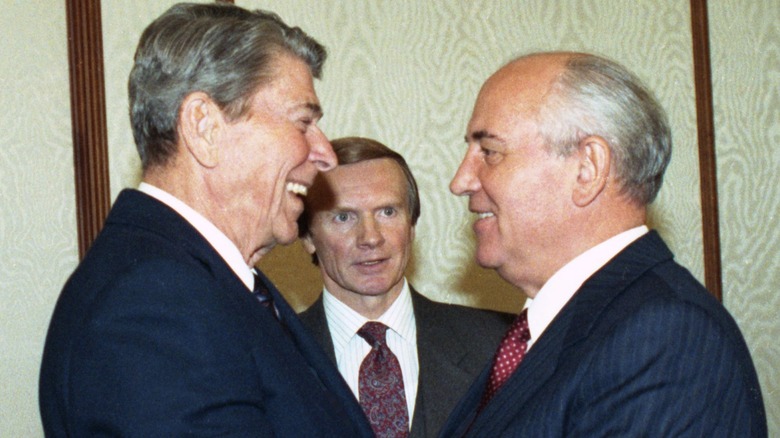What Happened To Mikhail Gorbachev?
During the Cold War, the seemingly endless detente between the United States and its allies, led by American president Ronald Reagan, and the Communist bloc, dominated and dictated by the Soviet Union, that vast country's leader, Mikhail Gorbachev, was something of a boogeyman. Nuclear war was a persistent, looming threat and the USSR was the "Evil Empire" according to Reagan, with Gorbachev an avatar of the menace posed by the country. But then, thanks in large part to Gorbachev taking the reins of a Soviet economic and social restructuring plan called Perestroika, he opened up himself, his government, and the USSR to the West. Then in 1991, Gorbachev found himself out of a job when his policies led to the end of Communism in Europe and the complete dismantling of the Soviet Union.
Once a major newsmaker (and Nobel Peace Prize winner), Mikhail Gorbachev's image faded from American newspapers and thoughts once he was no longer leader of their greatest enemy and in charge of a nuclear arsenal. So, what's he busied himself with since then? Here's what the major world leader has been up to since the fall of the Iron Curtain 30 years ago.
Mikhail Gorbachev hit the road
As a widely respected, fascinating, and somewhat misunderstood figure from what was then perceived as a mysterious and exotic country, the Soviet Union, Mikhail Gorbachev easily became a major draw on the worldwide academic lecture and personal appearance circuit.
According to the Tampa Bay Times, Gorbachev made three international trips in rapid succession after leaving office on Christmas Day in 1991. Following popular engagements in Germany and Japan, Gorbachev headed to the U.S. in May of 1992, embarking on a 13-day, 7-city tour of the United States. The trip was suggested by his former counterpart and adversary-turned-friend, ex-U.S. president Ronald Reagan. Along with his wife, Raisa, and daughter, Irina, Gorbachev visited Reagan at his ranch in California, then departed for Fulton, Missouri, to deliver a speech at the site where Winston Churchill coined the term "Iron Curtain" to describe Soviet and communism influence on Europe in a 1946 address.
Gorbachev's visit to the U.S. was well-received. At a stop in California, 4,000 people paid $40 for the privilege of hearing the former Soviet Union leader speak, according to the New York Times, putting Gorbachev's team on its way toward raising $3 million of the estimated startup costs needed to create a foundation. Mikhail Gorbachev's engagement in Manhattan on the tour was purely a fundraiser — he met with representatives of the well-endowed Rockefeller, Carnegie, Mellon, Ford, and Pew family foundations.
Mikhail Gorbachev wrote a lot
Barely a few months after stepping down as president in the last days of the Soviet Union, Mikhail Gorbachev had already lined up his next professional pursuit: writing. In February 1992, the New York Times announced that Gorbachev would compose a series of political commentary columns reflecting on Russian international relations, the state of communism, and the Persian Gulf War. Initially created for the Turin, Italy, newspaper La Stampa, the Times syndicated the column outside of Europe, a service it provided to Gorbachev again when he resumed his long-dormant feature in 2007, according to UPI.
The former statesman has additionally and prolifically produced and co-authored many long-form works, translated into other languages and published around the world. In 1996, Gorbachev wrote his first collection, "Memoirs," followed by the reflective "Gorbachev: On My Country and the World" three years later. In 2016, Gorbachev's "Posle Kremlya" ("After the Kremlin") was translated into English under the name "The New Russia," and then he wrote some more in 2020's "What Is At Stake Now: My Appeal for Peace and Freedom."
Mikhail Gorbachev's 1996 presidential run was a disaster
After five years of giving lectures about politics and writing about his life and accomplishments at the world's highest levels, Mikhail Gorbachev felt the itch to get back into the game.
According to the Washington Post, Gorbachev publicly floated the idea of a political comeback in mid-1993, before ultimately announcing his intention to enter the race for the Russian presidency in March 1996. In the lead-up to the expected announcement, Gorbachev's name was included in politician popularity and presidential hopeful polls, but less than 1% of respondents said they liked Gorbachev enough to vote for him. The former (and possibly future) president chalked that up not to lingering feelings over the collapse of the Soviet Union, but as evidence of a secret plot to keep him down, attesting that he was truly popular with the people of Russia, who would carry him to a victory in the election late that year.
Gorbachev ran on a platform of being a leader of a democratic coalition, a third choice to the government of incumbent Boris Yeltsin or a return to communism. It didn't work — at all. According to the Chicago Tribune (via the South Florida Sun-Sentinel), Yeltsin cruised to re-election, with Gorbachev receiving 350,000 votes of the 70 million cast — 0.5% of the electorate, and in 7th place out of 10 candidates.
Mikhail Gorbachev started a new political party
Apparently undeterred by his monumental defeat in the 1996 Russian presidential election, Mikhail Gorbachev made another attempted re-entry into national politics in the early 2000s. According to MosNews, he founded — or re-established — the Social Democratic Party of Russia, a political party whose history goes back to an 1898 movement that gained some traction and influence in Russia before the Bolshevik Revolution and the creation of the Soviet Union.
Operating throughout Russia under Gorbachev's command, the new Social Democratic Party flopped, securing a grand total of zero seats in the lower house of Russia's parliament, according to Reuters. In 2004, per the Chicago Tribune, Gorbachev resigned from his party leadership post following a disagreement with SDP chairman Konstantin Titov, who wanted to align with the Vladimir Putin-supporting United Russia party, which the former president was against.
The Social Democratic Party of Russia was so unsuccessful that it was banned from existence by the government. It was in violation of a law requiring a party to create local offices in the majority of Russian areas, and so it was forcefully dissolved in early 2007.
Mikhail Gorbachev hobnobbed with adoring celebrity fans
In Russia, Mikhail Gorbachev is widely blamed for sending the country into political and social chaos when he helped facilitate the end of the Soviet Union. In non-communist Western Europe and the United States, he's respected and held up as a hero for much the same reasons. The latter was on full display in April 2011 at the star-studded 80th birthday celebration of the last leader of the U.S.S.R. According to The Atlantic, a crowd of 4,000 well-wishers gathered at London's classy Royal Albert Hall to pay tribute to Gorbachev, including movie stars like Sharon Stone and Kevin Spacey, paying between $300 and $160,000 for tickets to the Beluga Caviar and Christie's Auction House-sponsored event, with proceeds going to cancer charities.
A variety of musical acts performed, including Paul Anka (dedicating his composition, "My Way," to Gorbachev), Shirley Bassey (singing the James Bond theme "Diamonds are Forever"), and German hard rock band Scorpions, doing "Wind of Change," its 1990 hit about the fall of Communism. President Bill Clinton, Polish president Lech Walesa, Bono, and Sting all sent in video messages, as did Arnold Schwarzenegger, who called Gorbachev his "hero." Ted Turner labeled the ex-president "the man of the century." When Gorbachev took the stage at the love fest, he said, "I had to live through very much. "But I have to say: I am a happy man."
He appeared in ads for Pizza Hut, Apple, and Louis Vuitton
It's often startling to see a politician in a TV commercial or print advertisement, an odd juxtaposition of an admired and once-powerful leader taking a gig for money to shill for some company. It was particularly odd for television viewers and magazine readers to see Mikhail Gorbachev so actively participating in capitalism, seeing as how he was the human embodiment of its opposite, communism, for so many years.
In 1997, according to the New York Times, Gorbachev starred in a commercial for Pizza Hut, after turning down several other endorsement proposals. "I thought that it is a people's matter — food," he said. "This is why if my name works for the benefit of consumers, to hell with it." He reportedly earned close to $1 million for the spot, which he funneled into his research foundation. The ad ran in many international markets, but never in Russia.
Gorbachev's print ad work is more robust and varied than his TV commercial work. In 1994, according to Ad Age, his image dominated a magazine ad for Apple Computer. As part of its "Think Different" campaign, in which the anti-PC aligned itself with historical iconoclasts, Gorbachev was held up as a rebel because of his Soviet Union reforms. In 2007, Gorbachev returned to advertising, appearing in a campaign for luxury goods maker Louis Vuitton, according to the New York Times.
Mikhail Gorbachev recorded an album
In 2009, 10 years after the death of his wife, Raisa Gorbachev, Mikhail Gorbachev remembered her in a way that was unique for a statesman and politician — he cut an album of Russian standards and romantic ballads. According to NME, "Songs for Raisa" included seven songs that were some of his late wife's favorites. Gorbachev didn't do it alone; to ensure some level of professionalism and musical quality, he collaborated with Andrei Makarevich, leader of the Russian band Machine Vremeni.
Per The Guardian, the album was unveiled at a charity auction held in London, set to benefit a charity tied to the album's inspiration, the Raisa Gorbachev Foundation. To whet the appetite of the 350 assembled bidders — a crowd of wealthy and prominent individuals which included "Harry Potter" author J.K. Rowling and Sarah Brown, wife of U.K. prime minister Gordon Brown — Gorbachev performed one of the songs on the album, "Old Letters," live.
The winning bidder was reportedly a British philanthropist who wished to keep their identity secret, and they put up £100,000 for "Songs for Raisa," the equivalent of about $164,000. The album has never been widely or commercially released.
When his wife died, his daughter and granddaughters moved in
According to the Washington Post, the presence and high visibility of Raisa Gorbachev, essentially the "First Lady" of the Soviet Union when her husband, Mikhail Gorbachev was president of the country, was unusual for that place and time. Taking on a role more akin to that of an American presidential spouse, Raisa Gorbachev accompanied her husband on foreign visits and advised him on important political matters, both of which earned criticism in the 1980s.
A de facto diplomat for the Soviet Union in its final years and an active partner both in both life and work, Raisa Gorbachev's death in September 1999 was devastating to Mikhail Gorbachev. After a diagnosis of a rare and severe type of leukemia (cancer of the blood), according to the Irish Times, Raisa Gorbachev received treatment at University Hospital in Muenster, Germany, but it was unsuccessful and she sadly died at age 67. Her body was flown back to Russia and buried in the prestigious Novodevichy cemetery in Moscow.
According to William Taubman's "Gorbachev: His Life and Times," the couple's adult daughter, Irina, moved in with her father after her mother's death. Not allowing him to live alone, Irina brought along her two daughters.
Mikhail Gorbachev created an environmental charity
In 1993, Mikhail Gorbachev used his experience and skills in organizing people and perpetuating ideas in a non-geopolitical fashion, forming the Green Cross International, according to SwissInfo. Inspired by the environmental action-encouraging Rio de Janeiro Earth Summit in 1992, Gorbachev created the think tank to spread awareness of, and advocate for, cleaner water, pollution eradication, renewable and alternative energy, and providing medical care for those suffering health problems as the result of pollution exposure. The non-profit, apolitical foundation operates chapters in the United States, Italy, Poland, and Switzerland, among other nations, with a membership of 13 million people.
In 2016, Gorbachev resigned his position as president of the Green Cross, ceding the role to Jean-Michel Cousteau, son of oceanographer and filmmaker Jacques Cousteau. A year later, Gorbachev resigned from the board of directors and renounced his title of "Founding President" after the group faced what he called "virtual insolvency" when some local chapters failed to pay dues, which he said reeked of "an attempt of aggressively hostile takeover."
Mikhail Gorbachev established some high-level forums and summits
Banking on and expanding on the diplomacy and open flow of ideas that won him the 1990 Nobel Peace Prize, Mikhail Gorbachev established the World Political Forum in 2003. According to Globus et Locus, Gorbachev endeavored to create a place for scientists, politicians, and religious leaders from various geographic and cultural backgrounds to connect with one another and discuss and analyze critical, interconnected issues. In 2006, Gorbachev opened an international seminar for the World Political Forum with a speech about the role of media responsibility in the encroaching age in which technology and information were rapidly expanding in both possibility and influence.
With similar aims in mind, Gorbachev chaired the World Summit of Nobel Peace Laureates. An exclusive club, it's a consortium of globe-changing individuals who, like Gorbachev, won the Nobel Peace Prize. Gorbachev spoke at the organization's 2012 event, alongside 19 other laureates from 17 nations.
Mikhail Gorbachev has had a whole bunch of serious health problems
Born in 1931, Mikhail Gorbachev was 60 years old when his tenure as the man atop the Soviet Union ended in 1991. He wasn't a young man then, and as time has aged the former official into his 90s, he's understandably and subsequently suffered a number of the major health issues that often accompany that period of one's life.
According to the AP (via the Denver Post), Gorbachev had surgery in Germany in 2006 to repair his carotid artery, the main channel of blood to the brain, 10 days after checking himself in because he felt abnormally tired and canceled a slew of international engagements. In 2011, according to UPI, Gorbachev endured a 2-hour spinal surgery at a hospital in Munich, Germany, just weeks after celebrating his 80th birthday. He recovered, but in 2014, he was back in Germany receiving treatment for what he told Russia News Service (via CNN) was "a disease recurrence" — he reportedly has a very serious variety of diabetes for which he frequently had treated at hospitals in Germany. And per NDTV, at 88 years old, Gorbachev was briefly hospitalized in Moscow for pneumonia.
According to CNN, Gorbachev finally succumbed to his worsening health on August 30, 2022, after a period of prolonged illness. He was 91.
Mikhail Gorbachev and Ronald Reagan had a plan in case of alien invasion
When he was the president of the Soviet Union in the mid-1980s, Mikhail Gorbachev apparently took his duties to look after his citizens very seriously — so seriously that he considered what to do should an extraterrestrial menace ever pose a threat to civilization. This was all revealed in the 2000s, well after Gorbachev's political tenure ended.
In 2009, according to the Christian Science Monitor, the American Jewish Historical Society presented a lecture moderated by PBS host Charlie Rose and featuring '80s-era U.S. Secretary of State George Schultz in conversation with Gorbachev. The latter recalled a moment during the 1985 Geneva Summit when he and U.S. President Ronald Reagan ducked out for a private conversation and a leisurely walk to a cabin. "President Reagan suddenly said to me, 'What would you do if the United States were suddenly attacked by someone from outer space? Would you help us?'" Gorbachev said he replied, "No doubt about it." To which Reagan said, "We too."
So there you have it — should hostile aliens have invaded the planet in the late 1980s, Reagan and Gorbachev would have at least paused the Cold War to team up and fight those evil E.T.s.
